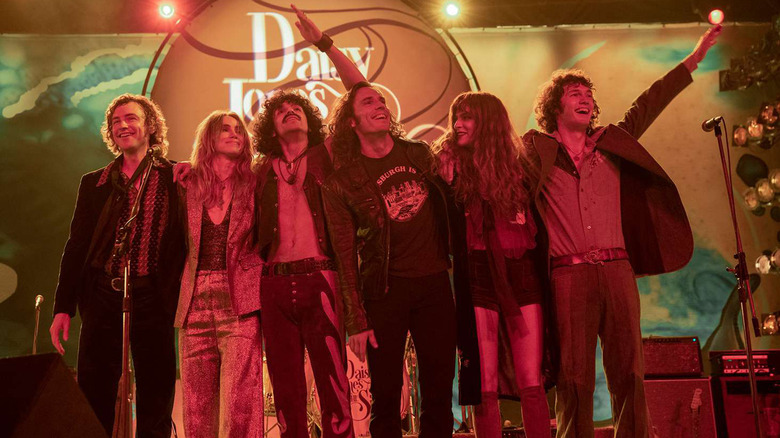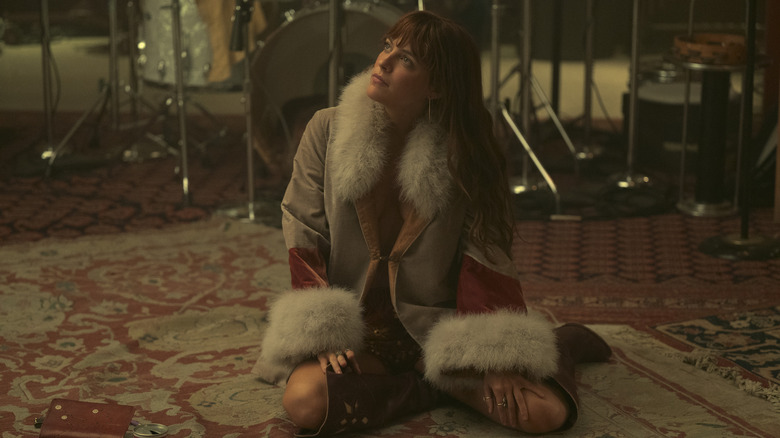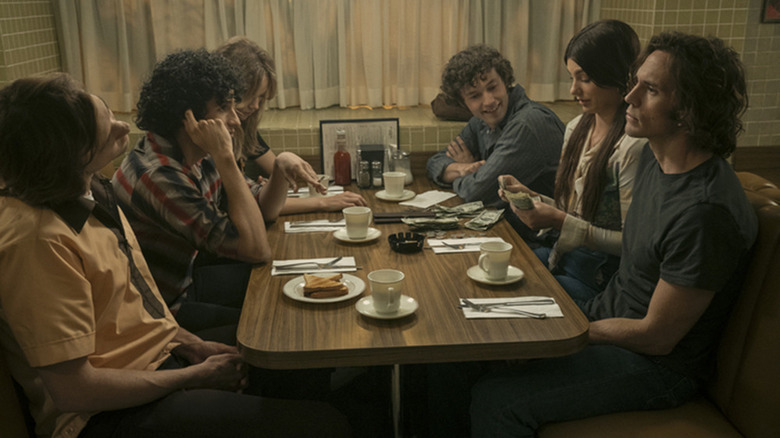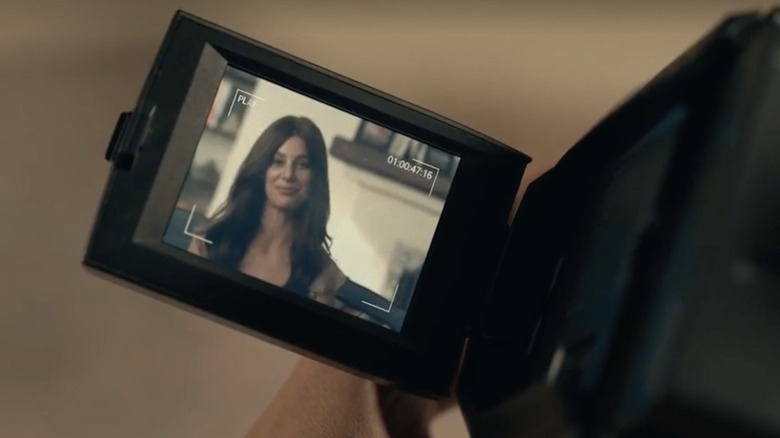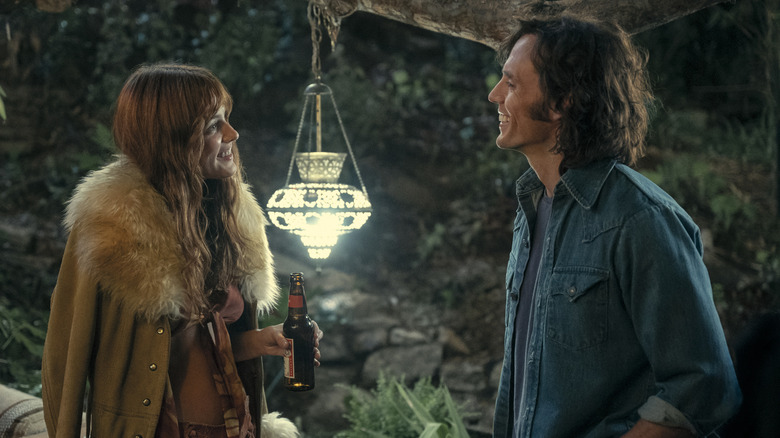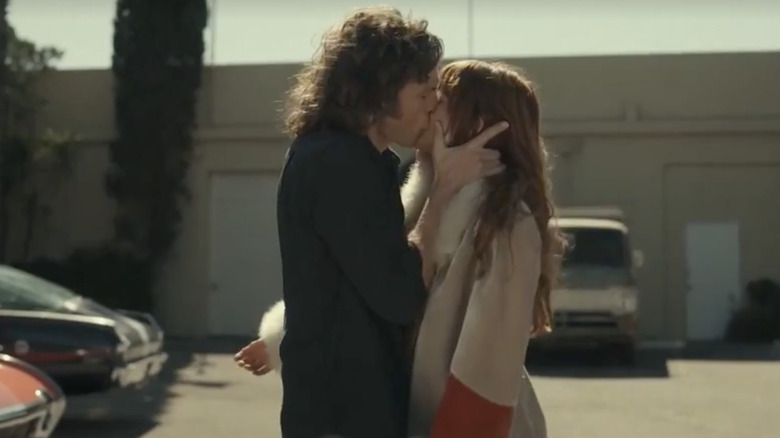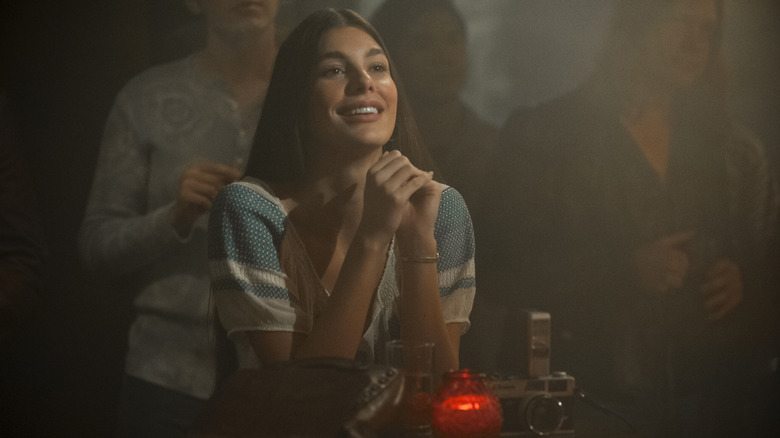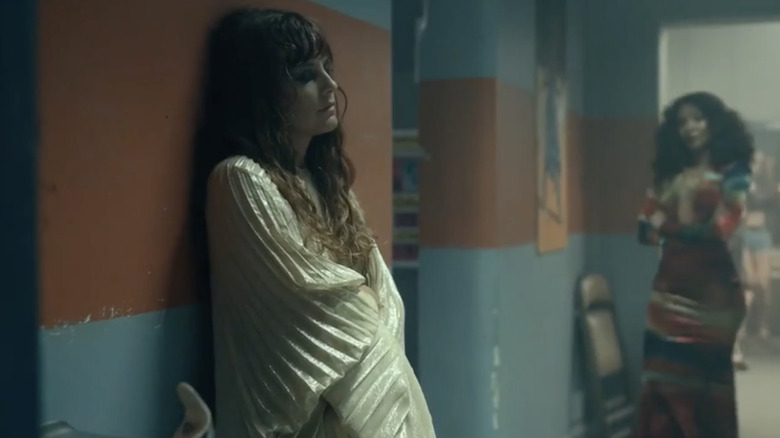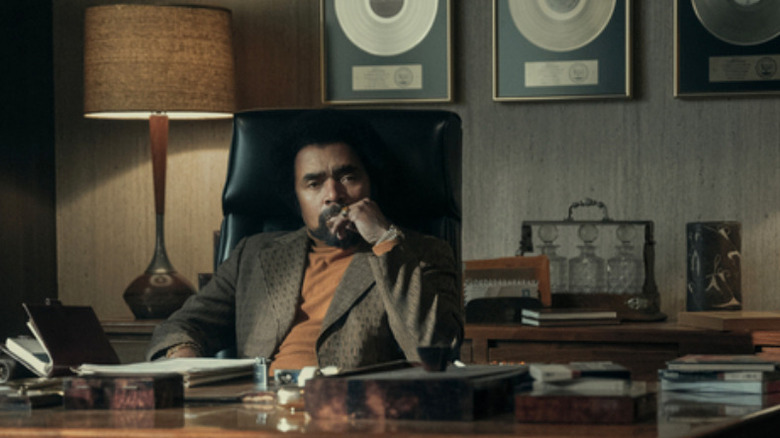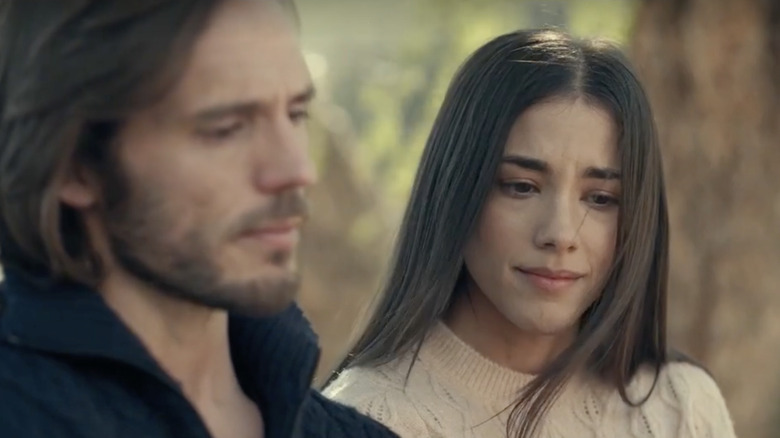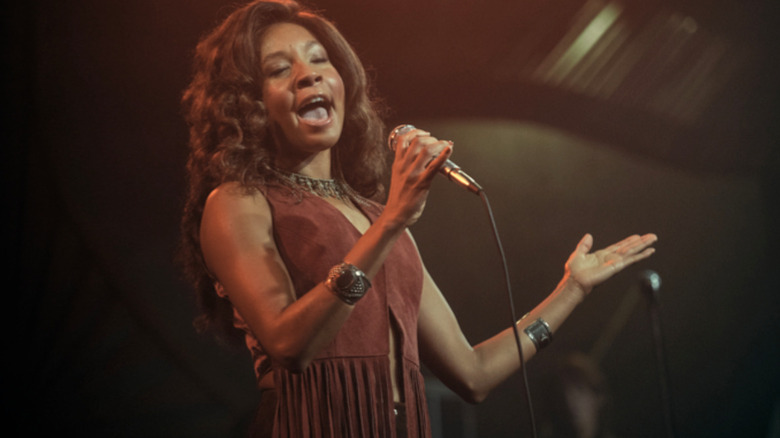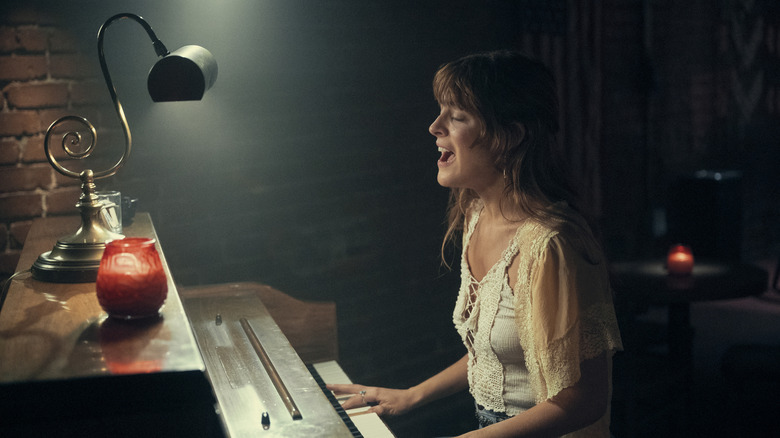Daisy Jones & The Six: The Biggest Differences From The Book Explained
Based on Taylor Jenkins Reid's international best seller of the same title, Prime Video's 2023 limited series, "Daisy Jones & The Six," is a fantastic adaption that understands the importance of show, don't tell. The book climbed the literary charts for various reasons, but its unique style and the astounding and memorable events within are at the top of the list. The book follows a fictional band recounting their time at the height of their career and the events that led to their breakup. Part of its success comes from the final few moments, where readers learn the interviewer's identity and tie loose ends together with the character's critical role in the band's life.
And today, Daisy Jones & The Six aren't merely a fictional rock band, but the story becomes more natural with an actual album out from Atlantic Records featuring its dynamic cast. While the book's writing style is strictly through interviews all the way through, the series allows viewers to not only see the recorded versions of the members speaking, but shows us the critical moments in the band's rise to fame.
However, like any book-to-screen adaptation, different mediums demand various changes to make the story work better. In an interview with New York Post, screenwriter Scott Neustadter states, "The book tells the story from the perspective of the characters' reminiscing, while the show depicts the 'truth," ultimately reassuring viewers why these changes are necessary for the story and a clever move as a storytelling tactic.
Warning: spoilers ahead!
Various introductions
The introductions in the limited series aren't too different from the book but significant enough to draw substantial changes to the dynamics. In the book, band manager Rod Reyes (Timothy Olyphant) introduces The Six to Teddy Price (Tom Wright). But in the show, Billy (Sam Claflin) and Graham Dunne (Will Harrison) find Teddy at a convenience store and convince him to listen to their record. We know that Billy is the ambitious go-getter who wants the band to become the greatest in the world from the books, and such decisions show us that much of their success is because of his choices.
Additionally, in the books, we're aware that the label doesn't care for the music Daisy Jones (Riley Keough) writes, which is why Teddy has her on a track with The Six. However, in the series, Teddy asks Daisy to join in on the recording of "Honeycomb" because the label isn't too keen on The Six's songs, as well as Billy burning bridges by canceling the original tour.
While this means that Billy still has his reservations against Daisy in the beginning, it makes more sense to have her join their band to liven it up as opposed to putting her with them to benefit her image. Also, in the book, Daisy has a band already, but they essentially don't exist in the show. As viewers dive further into their dynamics, this subtle change allows them to see how working together helps them both.
Where's Pete? What's Chuck doing?
The Six initially consists of brothers Billy and Graham Dunne, Karen Sirko (Suki Waterhouse), Warren Rhodes — Rojas in the show — (Sebastian Chacon), Pete Loving, and Eddie Loving — Roundtree in the series (Josh Whitehouse). But in the TV adaptation, Pete doesn't exist and there's no mention of him whatsoever. While Pete's role isn't as significant as the other band members, the change is a bit jarring at first, though it works to connect everyone more intimately. When arguing about their former band name, The Dunne Brothers, in Episode 2, they come up with "The Six" accidentally after Billy states the number of them in the diner, his wife Camila (Camila Morrone) included.
Camila is an integral part of the band and the reason Karen decides to join in the first place. She might not be an active participant on stage, but in more ways than one, she's the rock that keeps Billy afloat and everyone else a little more grounded than they otherwise would be. Camila's also the reason for the "Aurora" album cover and thus, having her be an unspoken member of The Six cements her importance beautifully. Further, Chuck (Jack Romano) doesn't die because he doesn't go to the Vietnam War but makes it as a dentist. We get five seconds of him in the future and a few brief moments in the beginning where he announces his departure.
Camila records her message
Prime Video's adaptation does a brilliant job of handling a fundamental change in the novel's ending by allowing the characters to see Camila's message in video form. In the books, she writes her three children an email detailing that after they've given their father time following her death, they should tell him to call Daisy. The email tells readers that Camila not only forgives Billy for everything but that, like everyone else in the world, she, too, was a massive fan of the music Daisy and Billy made together. But in recording form, her message is far more powerful, allowing Camila Morrone to bring some of the most vulnerable performances to our screens.
In the video, she details that she was always Daisy's biggest fan and that not only should Julia tell her father to call Daisy, but she should tell Daisy to answer. Julia Dunne shows the video to her father and Daisy, allowing them the closure necessary from all the heartbreak that the final performance in Chicago and everything before caused. It also allows Daisy to see that someone as good and kind as Camila cared for her at a time when so few genuinely did.
Billy and Daisy reunite
Reid's book ends with the email and no other sign about whether Billy called Daisy. But in the last few seconds of the show, Billy chooses to visit her, and Daisy allows him inside. Though it's the final scene of the series and viewers don't know what their future has in store, knowing that they reunite is enough to show the audience that substantial healing could take place here. Part of the appeal of "Daisy Jones & The Six" is the unconventional love triangle the story presents fans with. It's easy to adore both Camila and Daisy, and at the same time, Billy's choice is almost always obvious when usually it's hard to tell with the one in between two people.
Further, Camila's letter and video aren't so much about reuniting Daisy and Billy in a romantic sense, but it's an ode that can allow them to mend the broken bridges from their final performance. While Daisy and Billy do leave off in a better, more hopeful place in the show, we see how much pain and suffering it causes them both. In reuniting with one another, they could put all the heartbreak aside, celebrate Camila's life, and, most importantly, finally write the song that they owe her.
Billy kisses Daisy
One of the most fascinating details about the book is that Billy and Daisy don't ever hook up. We can say the same about their dynamic in the show, but they take it a bit farther than the overwhelmingly burgeoning emotions and fiery performances on stage. While Billy cheats on Camila during the initial leg of The Six's tour without Daisy, after rehab, the infidelity is in the past. But in the show's sixth episode, Billy kisses Daisy to get her to sing "More Fun To Miss."
While it might seem as though the change is minuscule, it bodes well to showcase Billy's complexities as a character. While he's deeply flawed in the book, some of Billy's decisions almost don't match his persona. In the book, Daisy attempts to kiss him, but he says that they can't, whereas there's also a kiss in the series finale. In contrast, this decision, committing this mistake, then going back on it, makes it easier to understand both how conflicting his feelings are and his inner demons.
Camila sleeps with Eddie
In the book, there's a brief scene where Billy mentions Camila was out with a friend from school and stays out later than usual. We don't get details about that night, but the show implies that Eddie and Camila slept together after he found her drinking alone at a bar. Eddie's crush (or deep admiration) on Camila is evident from the moment we meet her in the first episode. While Camila and Billy meet at a laundromat instead of a performance like in the book, a comment Eddie makes seems to imply that he's been crushing on her for a while.
The crush never dulls but undoubtedly increases over time, even more so after the one night they spend together. The decision to give a moment like this to Camila is one of the show's best calls because it allows her to take back her agency and do something for herself outside of her relationship with Billy. Her photography is the outlet, but with everything he pulls her through, this is her way of taking back. While neither the text nor the series implies that she isn't her own woman, this direct action is hers and hers alone, making it the kind of moment that shows she's in control of her life and the choices she makes.
Daisy decides to go to rehab on her own
The final performance in Chicago changes everything for the band, both in the book and in the show, but one significant moment encourages Daisy to go to rehab once and for all. In the book, Camila tells her to do so, but in the show, Daisy commits to it after seeing Billy's relapse. While she doesn't explicitly say it's her choice, when Simone (Nabiyah Be) finds her and tells her that it'll be under the radar, it implies that there must have been a previous conversation. Further, during their encore, she tells the audience, "If you're lucky enough to find somebody who lifts you up, even when you don't deserve it, that's where the light is."
As the audience sings back to them, Daisy tells a tearful Billy to go. A moment like this is substantial on paper, but Keough and Claflin's performances make it extraordinary. It shows viewers that despite everything they've been through, they both know that chasing the light is the key necessary to fully heal from their demons and become better versions of themselves. Daisy tells Julia later that she knows the two of them wouldn't have been good together, and her life wouldn't be what it is today if she didn't leave that night. This way, the show not only gives Camila her own agency, but Daisy as well to allow everything in life to boil down to this very moment.
Teddy's death
Teddy Price's death is a tremendous turning point in the book and one of the reasons Daisy starts using again after deciding to get clean. His death greatly impacts each character, but it isn't necessary as anything but a plot device. Thus, the show's decision to delay it until 1983 is incredible. Teddy still has the heart attack that lands him in a hospital and temporarily puts the band's emotions through the wringer, but we don't have to watch the character die on screen.
This way, each character makes the decisions they do by virtue of their demons and circumstances. But at the same time, viewers get to watch Teddy give one final interview on "The Merv Griffin Show," and we also learn that he made music until his last breath. Teddy gets to see and understand how grateful the band is for him while they allow themselves quiet moments of vulnerability to reflect on how precious life truly is at the hospital.
20-year time jump instead of 35
The change in the time jump between the final Chicago performance and when the interviews take place is both heartbreaking and hopeful. It's tragic because it means that Camila got to live a much shorter life with her loved ones, and that isn't a fate the character deserves. Despite the detail that those final years were better than the ones before, it's never easy to grapple with, even if it's just fiction. Yet, it's hopeful because the interview gives each member of the band time to grieve and heal at an age where they still have a good chunk of life ahead of them. Judging by the lack of prosthetics and such in makeup, it's safe to assume that the characters aren't in their 60s here.
The tough choices that they each make don't allow them the proper time to give it everything that they get. There's immense heart and profound sadness remaining between each of them in that final show that they all deserve the chance to be together again for a while. And while we don't know if that happens, their reflections of the '70s undoubtedly allow them to clean some lingering scabs. To see them teary-eyed by the end of it tells the audience a thousand words in silence.
We see more of Simone
"Daisy Jones & The Six" writers understand the critical role of Simone Jackson in the book and thankfully give her significantly more time on-screen with and without Daisy. It's also a wise thing to do, considering what an incredible performer Nabiyah Be is. In the book, we don't know much about Simone's personal life, only that she eventually has a daughter and she's more successful in the industry than her mother.
In the show, we watch Simone navigate through the disco scene, find love, and showcase hesitations and fears while being the one constant in Daisy's life. We also get a clearer exhibition of the detail that without her, Daisy wouldn't be the woman she is, which shows how vital strong friendships between women can be.
The series also shows Simone falling in love with a woman and coming to terms with her sexuality while simultaneously exploring different sectors of the jazz world. The character we see on screen is more fleshed out, memorable, and incredibly loyal as the most grounded character in the series. She opens her own club with her partner Bernie (Ayesha Harris) as a place full of inclusive performances where everyone's welcome.
Daisy has a daughter and twins don't exist
Though we only get a sentence about Daisy's sons and glimpses of Billy and Camila's twins, it's interesting that the series chose to change these facts. It works best for Daisy in a way because though she doesn't adopt two boys, the detail that she has a daughter is as though it's a second chance for her to be the kind of mother she never had. It's her shot to raise a daughter who knows intense love in the world that's perpetually against her. Because of her experiences and the decision to get clean, Daisy could raise a little girl to stand on her own two feet while knowing that she doesn't have to "be broken" despite the circumstances in the world.
Additionally, because there's no mention of the twins in the show, it's safe to say that they probably don't exist. It was shocking how much Camila endured on her own with Billy's absence, and with the way the show handles their fights, it's fitting that there wouldn't be more kids in their lives after Julia. Tragic, still, but more understandable because the mess becomes that much more palpable.
